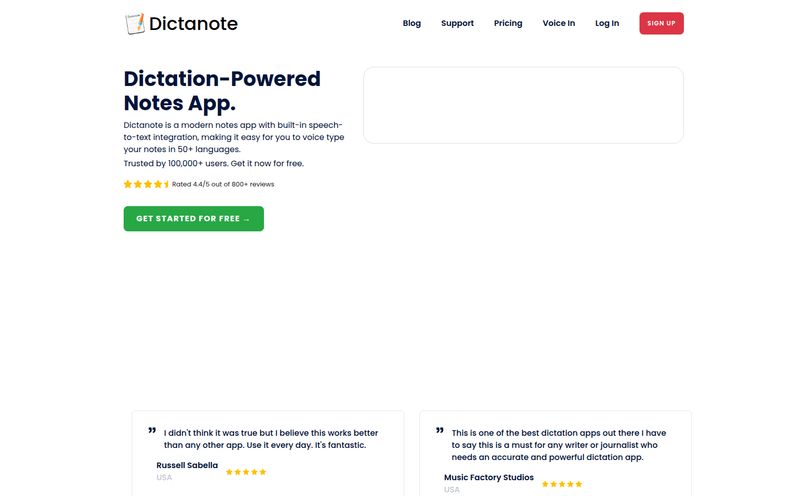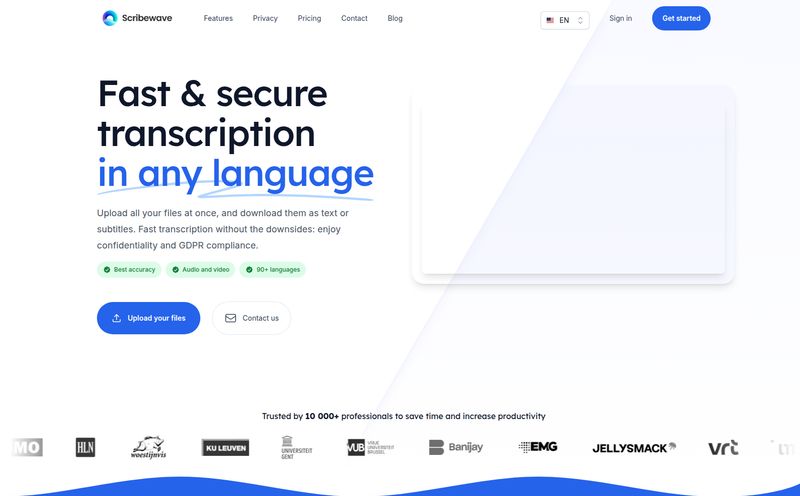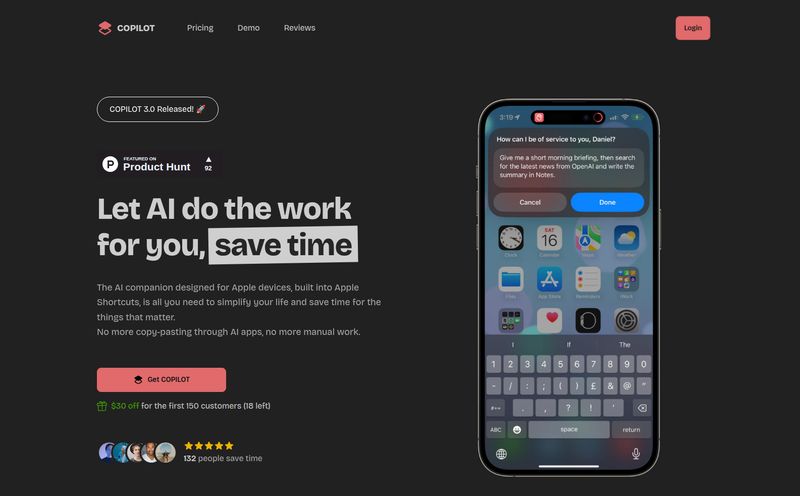How many hours of your life have you lost to frantically typing notes during a meeting or a lecture? You’re trying to capture every golden nugget of information, but you’re so focused on typing that you completely miss the nuance of the conversation. Your keyboard sounds like a machine gun, you've got three different abbreviations for the same concept, and by the end, your notes look like a toddler’s grocery list. I’ve been there. I once missed a critical action item on a client call because I was trying to correctly spell “synergy” (they didn’t even say synergy, my brain just panicked).
It’s a problem as old as meetings themselves. We need a record, but the act of creating that record pulls us out of the moment. For years, we've been promised a solution. And now, with the absolute explosion of AI tools, it feels like we might actually be close. Enter bulluga, a new player in the AI note-taking game that claims it will “revolutionize note-taking.”
Big words. But as someone who’s spent years watching digital trends and testing productivity hacks, I’m both skeptical and hopeful. So, let’s pull back the curtain and see if bulluga is the real deal or just another piece of vaporware.

Visit bulluga
So, What is Bulluga, Exactly?
At its core, bulluga is an AI-powered transcription and note-taking service. You feed it audio from your meetings or lectures, and it spits out automated notes. Think of it less like a simple voice-to-text app and more like having a hyper-efficient personal assistant sitting in on your calls, whose only job is to listen intently and create a clean, organized summary of what was said. No coffee breaks, no sick days, just pure, unadulterated note-taking.
The platform is built on a few key pillars that are worth talking about:
- AI-Powered Transcription: This is the engine of the whole operation. Bulluga listens to the audio and converts it into text. This isn't new tech, services like Otter.ai have been doing it for a while, but the quality of AI transcription has improved dramatically in the last couple of years.
- Automatic Note Creation: This is where things get interesting. Bulluga doesn't just give you a wall of text. It claims to automatically create notes. This implies some level of intelligent summarization—pulling out key points, identifying action items, and structuring the information in a way that's actually useful. It’s the difference between getting a raw transcript and getting a polished set of minutes.
- Built-in Collaboration: The notes aren't just for you. They’re designed to be shared, making it a tool for teams and study groups. This means you can centralize the record of a meeting or lecture, ensuring everyone is on the same page. No more, “Wait, what did Sarah say we should do about the Q3 report?” arguments.
Who Is This Really For? A Tale of Two Users
I see two major groups who could get a ton of value out of a tool like this, and they have slightly different needs.
The Overwhelmed Student
I wish I had this in college. I can practically smell the stale coffee and hear the professor droning on about macroeconomics. For students, bulluga could be a game-changer. Imagine being able to sit in a lecture and actually listen. To think critically about the topic and formulate questions, instead of just being in stenographer mode. You could record the lecture, get a full set of notes automatically, and then use that text to search for keywords, generate flashcards, or clarify points you missed. It changes studying from an act of transcription to an act of genuine learning. It could seriously help students who struggle with auditory processing or just have notoriously fast-talking professors.
The Meeting-Fatigued Professional
If you're in the corporate world, your calendar is probably a terrifying mosaic of back-to-back meetings. Who’s taking notes? Who’s tracking action items? Who’s responsible for sending out the summary? These are the little administrative burdens that drain our collective will to live. Bulluga aims to automate that whole process. One person hits record, and afterward, the entire team gets a shareable, accurate record of the discussion. This is massive for project management, team alignment, and just plain old accountability. It creates a single source of truth that can settle disputes and keep projects moving forward. It’s like a silent, unbiased participant in every meeting.
The Good, The Bad, and The Realistic
No tool is perfect, right? It’s always a trade-off. Based on what we know, here’s my breakdown of what to get excited about and what to be cautious of.
The Advantages of Using an AI Scribe
The biggest win here, for me, is the time and mental energy you get back. It's not just a little bit of time, it’s reclaiming your focus during important conversations. Instead of being a passive note-taker, you can be an active participant. The collaboration features are also a huge plus. Centralizing notes prevents information silos and misunderstandings, which is a constant struggle in any team environment. And if the AI-powered transcription is as accurate as they claim, it eliminates the tedious task of cleaning up messy, human-typed notes.
Potential Hiccups and Real-World Catches
Okay, let's ground ourselves in reality. The platform's effectiveness hinges on one major thing: audio quality. This is the Achilles' heel of all transcription services. If you're in a quiet room with a good microphone, you'll probably get fantastic results. But if you’re trying to record a meeting in a noisy coffee shop with five people talking over each other... well, the AI is going to have a tough time. Garbage in, garbage out. That's a fundamental law of computing that even the smartest AI can't break. The documentation also mentions that it requires JavaScript (which is standard for most web apps these days, so not a huge deal) and may require an internet connection for the transcription to happen, which means it might not be ideal for on-the-go, offline note-taking.
"The promise of AI is to automate the mundane so we can focus on the meaningful. Tools that nail this will define the next generation of productivity."
The Million-Dollar Question: What's the Price?
Here's teh thing. As of right now, there's no public pricing information available for bulluga. This isn't uncommon for a new tool that might be in a beta phase or still figuring out its go-to-market strategy. I dug around, but their pricing page is currently a ghost town.
So what can we expect? In my experience, tools in this space usually follow one of a few models:
- A Freemium model, offering a certain number of transcription minutes for free each month, with paid tiers for more usage and advanced features.
- A Per-User/Per-Month subscription, common for business-focused SaaS products.
- A Pay-As-You-Go model, where you buy credits for transcription hours.
My gut says they'll go with a freemium approach to attract students and individual users, with a more robust team plan for businesses. But that's just an educated guess. For now, you'll have to keep an eye on their official website for announcements.
Final Thoughts: Is Bulluga Worth Your Attention?
So, should you be excited? I think so. Cautiously optimistic, at least. The concept behind bulluga isn't just another shiny object; it solves a real, persistent pain point for a massive number of people. It’s not about replacing human thought, but about augmenting it. It’s about offloading the boring, mechanical task of transcription so we can be more present, more creative, and more engaged in our work and studies.
The success of bulluga will come down to execution. How accurate is the transcription in real-world scenarios? How smart is the automatic note creation? Is the interface intuitive and easy to use? These are the questions that can only be answered with hands-on testing. But the promise is there. And for anyone tired of being their own personal court reporter, that promise is a pretty exciting one.
Frequently Asked Questions about Bulluga
1. What exactly is bulluga?
Bulluga is an AI-powered tool designed to automatically transcribe audio from meetings and lectures and then generate organized notes from that transcription. It's aimed at both students and professionals to save time and improve collaboration.
2. How accurate is the AI transcription?
While bulluga claims high accuracy, the quality will heavily depend on the clarity of the audio. In a quiet setting with a clear speaker, you can expect very high accuracy. In noisy environments or with multiple people speaking at once, the accuracy will likely decrease, which is typical for all AI transcription services.
3. Can I use bulluga without an internet connection?
Based on the available information, it seems an internet connection is likely required for the transcription process to work, as the audio data needs to be processed by AI servers. It may not be suitable for offline note-taking.
4. Is bulluga a good tool for students?
Absolutely. It has the potential to be incredibly helpful for students by allowing them to focus on understanding a lecture rather than just typing it out. The automated notes can then be used as a powerful study aid.
5. How does the collaboration feature work?
The collaboration feature allows notes from a meeting or lecture to be easily shared with a team or study group. This ensures everyone has access to the same information, which helps with team alignment, project tracking, and group studying.
6. Is bulluga free to use?
Currently, there is no public information on bulluga's pricing. It's possible they will offer a free tier with limited features or a free trial, but we'll have to wait for an official announcement from the company.
References and Sources
- Understanding AI Transcription Accuracy (TechRepublic)
- Tips for High-Quality Audio Recording (Otter.ai Blog)



